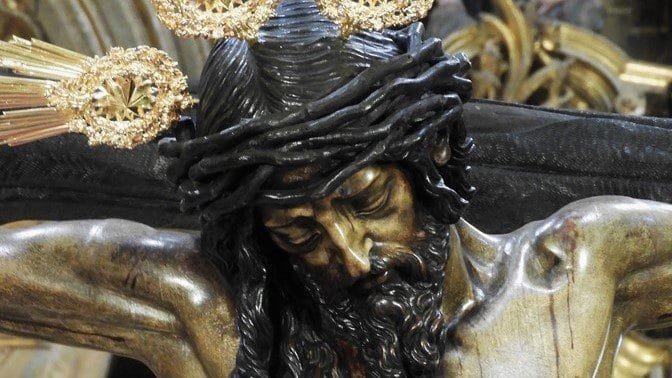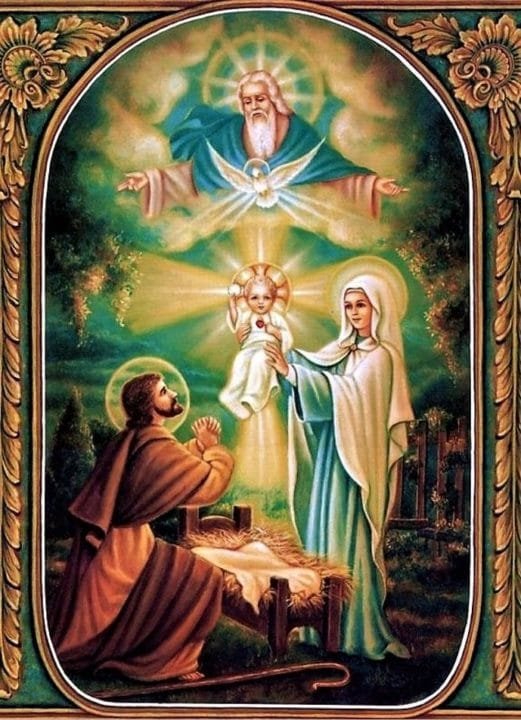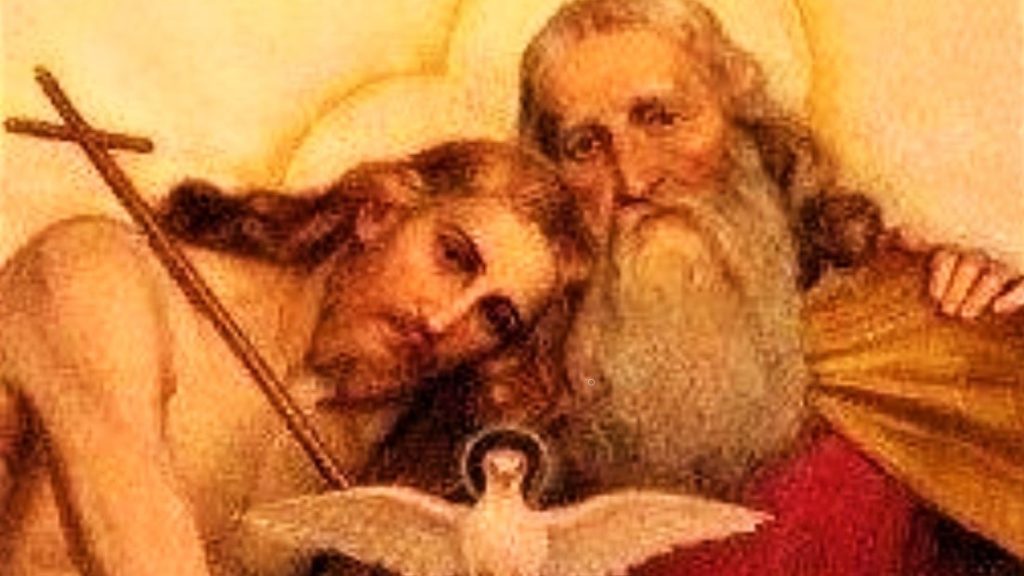Friday in the Fourth Week of Easter
DAILY GOSPEL COMMENTARY:
“I am the way and the truth and the life (Jn 16:6).”

READING I
Acts 13:26–33
When Paul came to Antioch in Pisidia, he said in the synagogue: “My brothers, children of the family of Abraham, and those others among you who are God-fearing, to us this word of salvation has been sent. The inhabitants of Jerusalem and their leaders failed to recognize him, and by condemning him they fulfilled the oracles of the prophets that are read sabbath after sabbath. For even though they found no grounds for a death sentence, they asked Pilate to have him put to death, and when they had accomplished all that was written about him, they took him down from the tree and placed him in a tomb. But God raised him from the dead, and for many days he appeared to those who had come up with him from Galilee to Jerusalem. These are now his witnesses before the people. We ourselves are proclaiming this good news to you that what God promised our fathers he has brought to fulfillment for us, their children, by raising up Jesus, as it is written in the second psalm, You are my Son; this day I have begotten you.”
RESPONSORIAL PSALM
R. You are my Son; this day I have begotten you.
Or: Alleluia.
“I myself have set up my king
on Zion, my holy mountain.”
I will proclaim the decree of the Lord:
The Lord said to me, “You are my Son;
this day I have begotten you.”
R. You are my Son; this day I have begotten you.
Or: Alleluia.
“Ask of me and I will give you
the nations for an inheritance
and the ends of the earth for your possession.
You shall rule them with an iron rod;
you shall shatter them like an earthen dish.”
R. You are my Son; this day I have begotten you.
Or: Alleluia.
And now, O kings, give heed;
take warning, you rulers of the earth.
Serve the Lord with fear, and rejoice before him;
with trembling rejoice.
R. You are my Son; this day I have begotten you.
Or: Alleluia.
ALLELUIA
I am the way, the truth, and the life, says the Lord; no one comes to the father, except through me.
GOSPEL
Jn 14:1–6
Jesus said to his disciples: “Do not let your hearts be troubled. You have faith in God; have faith also in me. In my Father’s house there are many dwelling places. If there were not, would I have told you that I am going to prepare a place for you? And if I go and prepare a place for you, I will come back again and take you to myself, so that where I am you also may be. Where I am going you know the way.” Thomas said to him, “Master, we do not know where you are going; how can we know the way?” Jesus said to him, “I am the way and the truth and the life. No one comes to the Father except through me.”
GOSPEL COMMENTARY
from the Navarre Bible, Gospel of St. John (with permission)

- 1-3 Apparently this prediction of Peter’s denial has saddened the disciples. Jesus cheers them up by telling them that he is going away to prepare a place for them in heaven, for heaven they will eventually attain, despite their shortcomings and dragging their feet.
- The return which Jesus refers to includes his second coming (Parousia) at the end of the world (cf. 1 Cor 4:5; 11:26; 1 Thes 4:16-17; 1 Jn 2:28) and his meeting with each soul after death: Christ has prepared a heavenly dwelling-place through his work of redemption. Therefore, his words can be regarded as being addressed not only to the Twelve but also to everyone who believes in him over the course of the centuries. The Lord will bring with him into his glory all those who have believed in him and have stayed faithful to him.
- 4-7 The Apostles did not really understand what Jesus was telling them: hence Thomas’ question. The Lord explains that he is the way to the Father. “It was necessary for him to say ‘I am the Way’ to show them that they really knew what they thought they were ignorant of, because they knew him” (St Augustine, In. Ioann. Evang., 66, 2).
- Jesus is the way to the Father — through what he teaches, for by keeping to his teaching we will reach heaven; through faith, which he inspires, because he came to this world so “that whoever believes in him may have eternal life” (Jn 3:1 5); through his example, since no one can go to the Father without imitating the Son; through his merits, which make it possible for us to enter our heavenly home; and above all he is the way because he reveals the Father, with whom he is one because of his divine nature.
- “Just as children by listening to their mothers, and prattling with them, learn to speak their language, so we, by keeping close to the Saviour in meditation, and observing his words, his actions, and his affections, shall learn, with the help of his grace, to speak, to act, and to will like him.
We must pause here. . .; we can reach God the Father by no other route…; the Divinity could not well be contemplated by us in this world below if it were not united to the sacred humanity of the Saviour, whose life and death are the most appropriate, sweet, delicious and profitable subjects which we can choose for our ordinary meditations” (St Francis de Sales, Introduction to the Devout Life, part II, chap. 1, 2).
- “Just as children by listening to their mothers, and prattling with them, learn to speak their language, so we, by keeping close to the Saviour in meditation, and observing his words, his actions, and his affections, shall learn, with the help of his grace, to speak, to act, and to will like him.
- Jesus is the way to the Father — through what he teaches, for by keeping to his teaching we will reach heaven; through faith, which he inspires, because he came to this world so “that whoever believes in him may have eternal life” (Jn 3:1 5); through his example, since no one can go to the Father without imitating the Son; through his merits, which make it possible for us to enter our heavenly home; and above all he is the way because he reveals the Father, with whom he is one because of his divine nature.
- “I am the way”:he is the only path linking heaven and earth. He declares this to all men, but he especially reminds those who, like you and me, have told him that we are committed to take our Christian vocation seriously: he wants God to be forever in our thoughts, on our lips and in all our actions, including the most ordinary, everyday things we do.
- “Jesus is the way. Behind him on this earth of ours he has left the clear outlines of his footprints. They are indelible signs which neither the erosion of time nor the treachery of the evil one have been able to erase” (St. Josemaria, Friends of God, 127).
- Jesus’ words do much more than provide an answer to Thomas’ question; he tells us, “I am the way, and the truth, and the life”. Being the Truth and the Life is something proper to the Son of God become man, who St John says in the prologue of his Gospel is “full of grace and truth” (1:14). He is the Truth because by coming to this world he shows that God is faithful to his promises, and because he teaches the truth about who God is and tells us that true worship must be “in spirit and truth” (Jn 4:23). He is Life because from all eternity he has divine life with his Father (cf. Jn 1:4), and because he makes us, through grace, sharers in that divine life. This is why the Gospel says: “This is eternal life, that they know thee, the only true God, and Jesus Christ whom thou has sent” (Jn 17:3).
- By his reply Jesus is, “as it were, saying, Where do you want to go? I am the Way. Where do you want to go? I am the Truth. Where do you want to abide? I am the Life. Every man can attain an understanding of the Truth and the Life; but not all find the Way. The wise of this world realize that God is eternal life and knowable truth; but the Word of God, who is Truth and Life joined to the Father, has become the Way by taking a human nature. Make your way contemplating his humility and you will reach God” (St Augustine, De verbis Domini sermones, 54).
On the other hand, St. Thomas Aquinas comments in his Commentary on the Gospel of Saint John 14,2
“Christ in person is the way, for this reason he says: I am the way. Which has a very true explanation, since through him we can approach the Father.
But, as this path is not far from its end, but is linked to it, he adds: And the truth, and the life; and thus, he himself is both the path and the end of it. It is the way according to his humanity, the term according to his divinity. In this sense, as a man, he says: I am the way; as much as God, he adds: And the truth, and the life, two expressions that adequately indicate the end of this path.
Indeed, the end of this path is the satisfaction of human desire, and man mainly desires two things: first, the knowledge of the truth, which is something specific to him; secondly, the prolongation of his existence, which is common to him with other beings. Now, Christ is the way to reach the knowledge of the truth, with everything and that he himself is the truth: Teach me, Lord, your way, so that I may follow your truth. Christ is also the way to get to life, with everything and that he himself in person life: You will teach me the path of life.
For this reason, the evangelist identifies the end of this path with the notions of truth and life, which he has previously applied to Christ. In the first place, he affirms that he is life, by saying that there was life in the Word; secondly, he affirms that he is the truth, when he says that he was the light of men, since light and truth mean the same thing.”
If you seek, then, where you have to go, welcome Christ in you, because he is the way: This is the way, walk on it. And Saint Augustine says: ‘Walk through man and you will arrive at God‘. It is better to walk on the road, even with a limp, than to walk quickly off the road. Because he who goes limping along the road, although he advances little, he is getting closer to the end; but he who walks out of the way, the more he runs, the more he goes away from the term.
If you are looking for where you have to go, adhere to Christ, because he is the truth to which we want to arrive…If you are looking for where you have to stay, adhere to Christ, because he is life: Whoever reaches me reaches life and enjoys the favor of the Lord.
So adhere to Christ, if you want to live securely; it is impossible for you to stray, because he is the way. For this reason, those who adhere to him do not go astray, but go on the straight path. Neither can they be deceived, since he is the truth and teaches the complete truth, since he says: I was born for this and for this I have come into the world: to be a witness of the truth. Nor can they be disappointed, since he is life and giver of life, just as he says: I have come that they may have life and have it abundantly.“
VIDEO REFLECTION
TOPIC: HOW DO YOU RESPOND TO YOUR PROBLEMS?
In today’s gospel reading, the backdrop is the Last Supper where Jesus bids his apostles farewell. And there is fear and anxiety for the future. Jesus tells His apostles not to be troubled. But they are, as one of them is tagged as the betrayer and many of them are unsure if they will hold on.
Jesus demands from them faith – to trust Him and hope in Him as He assures them that He will be back and take them with Him to His Father’s house, where there is plenty of room for all.
We may not understand many things in our lives. Things may not go the way we expect. We can at times be confused at how circumstances are panning out in front of us when we are doing what we can to establish a personal relationship with Jesus. Perhaps, we are not doing enough. Perhaps, we don’t trust God enough.
Stay updated: subscribe by email for free TO OUR NEW WEBSITE www.catholicsstrivingforholiness.org (PUT YOUR EMAIL IN THE SUBSCRIBE WIDGET).
We are also in www.fb.com/Catholicsstrivingforholiness. Kindly help more people in their Christian life by liking our page and inviting your family, friends and relatives to do so as well. Thanks in advance and God bless you and your loved ones! Fr. Rolly Arjonillo

